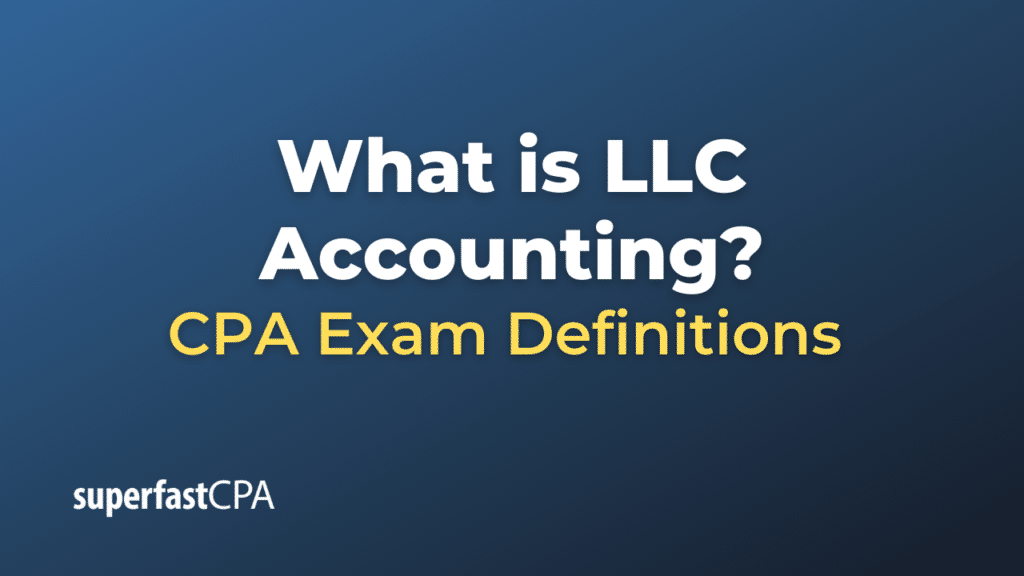LLC Accounting
LLC accounting refers to the accounting procedures and practices used by a Limited Liability Company (LLC). An LLC is a specific form of business structure in the United States that combines elements of partnerships and corporations, offering limited liability to its owners (known as members) and certain tax benefits.
Key aspects of LLC accounting include:
- Record Keeping: An LLC needs to maintain accurate and up-to-date records of all its financial transactions. This includes income, expenses, assets, liabilities, and member equity.
- Revenue and Expense Tracking: All sources of income and all expenses incurred by the LLC must be recorded. This includes sales revenue, interest income, cost of goods sold, operational expenses, taxes, and more.
- Balance Sheet Management: LLCs must maintain a balance sheet that includes assets (what the company owns), liabilities (what the company owes), and members’ equity (the ownership interest of each member).
- Income Allocation: Unlike corporations, LLCs do not pay income tax at the company level. Instead, income is passed through to the members who report it on their individual tax returns. Therefore, LLC accounting involves determining and tracking each member’s share of the company’s income or loss, which depends on the LLC’s operating agreement.
- Tax Preparation: Even though an LLC itself does not pay income tax, it usually needs to file an information return (Form 1065 in the US) with the IRS. This return reports the LLC’s income and deductions, and each member’s share of these amounts.
- Payroll and Member Draws: If an LLC has employees, it must handle payroll, including withholding and paying payroll taxes. Members usually do not receive a traditional salary, but instead take draws from the LLC’s profits, which also need to be tracked.
- Year-End Adjustments: At the end of the year, the LLC needs to make any necessary accounting adjustments, such as for depreciation, prepaid expenses, accrued expenses, etc.
It’s important for LLCs to keep accurate and complete financial records not only for tax purposes, but also for business management, potential audits, and possible future sale or transfer of the business. Many LLCs hire professional accountants or use accounting software to help with these tasks.
Example of LLC Accounting
Suppose there’s a small digital marketing agency named “MarketGenius LLC” with three members: Alice, Bob, and Charlie. They’ve agreed to share profits and losses equally. Here is an oversimplified example of how their accounting might look at the end of their first year:
Income Statement:
- Revenue: $150,000 (from various client projects)
- Expenses: $90,000 (employee salaries, office rent, software subscriptions, advertising, etc.)
- Net Income: $60,000 (Revenue – Expenses)
Balance Sheet:
- Assets: $25,000 (Cash, Accounts Receivable, Office equipment)
- Liabilities: $10,000 (Accounts Payable, Credit Card Debt)
- Member Equity: $15,000 (Assets – Liabilities)
Member Draws:
Alice, Bob, and Charlie decide to take draws from the LLC’s profit. They split the net income equally and each take a draw of $20,000 ($60,000 / 3).
This leaves the LLC with $40,000 in cash ($25,000 initial cash + $60,000 net income – $20,000*3 member draws).
Taxes:
MarketGenius LLC will file an information return with the IRS using Form 1065, reporting the $60,000 net income. Each member will receive a Schedule K-1 showing their $20,000 share of the income, which they will report on their individual tax returns and pay tax on.
Member Equity:
At the end of the year, each member’s equity in the LLC is their initial equity plus their share of the net income minus their draw. If they started with $0, their equity is now $0 + $20,000 – $20,000 = $0.
The accounting for an actual LLC would be much more complex, especially since this example doesn’t account for different classes of members, varying distribution rights, or the many other possible expenses and sources of income an LLC might have. But it does give a basic idea of how LLC accounting works.














